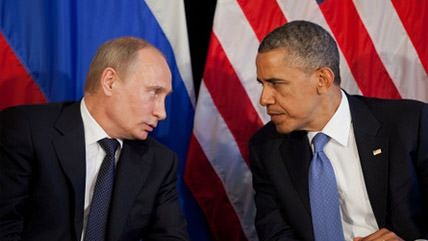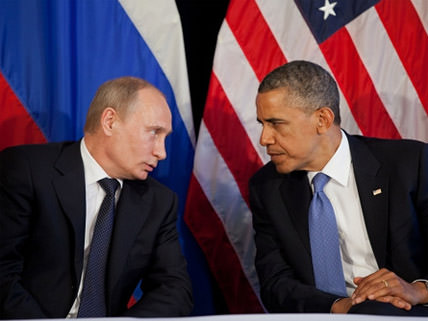How Effective Are U.S. Sanctions on Russia? 'Peanuts,' Says Russia


The U.S. government is weighing another round of sanctions against Russia for its meddling in eastern Ukraine. Piling on sanctions has been America's and the E.U.'s most trusted way of rapping Vladimir Putin's knuckles since he ordered the invasion and annexation of part of Ukraine in March. How effective have these sanctions been, though? It depends who you ask.
"Peanuts," says Russian Trade Minister Denis Manturov. "What sanctions? A holy place is never empty: If one market closes, another opens. What's happening today is peanuts compared to what was then," referencing American sanctions during the Soviet era.
Andrei Belousov, the Kremlin's top economic adviser told Reuters, "The sanctions in their current format don't have a macroeconomic effect. My assessment is that we're in the vicinity of 1 percent (gross domestic product growth) and will stay there until the end of the year."
However, suggests Bloomberg news, "Russia's richest businessmen are increasingly frantic that President Vladimir Putin's policies in Ukraine will lead to crippling sanctions and are too scared of reprisal to say so publicly."
Igor Bunin, head the Center for Political Technology in Moscow, told Bloomberg that "the economic and business elite is just in horror."
And, according to the Bloomberg Billionaire Index, "Amid market turmoil provoked by the Ukraine conflict, the 19 richest Russians lost $14.5 billion since the start of the year, compared to an increase in wealth of $56.5 billion for the richest 64 Americans."
Russia's got problems aside from sanctions. Crimea was pretty poor under Ukraine, getting by on tourism dollars, but since no one is keen on vacationing in a territory occupied by trigger-happy Russian troops, the government is considering hiking domestic taxes to ease the absorption of the peninsula. And, Russian taxpayers are still on the hook for the roughly $50 billion their government spent on the Sochi Olympics.
Sanctions aren't affecting Russia alone, though. They're having a negative impact on business in the E.U., particularly small and mid-sized businesses, according to the German paper Deutsche Welle.
"These [sanctions] affected about a quarter of German companies conducting activities abroad," said deputy head of the Association of German Chambers of Commerce and Industry Volker Treier in an interview this week. He added:
Every third job in Germany depends on exports. If we interrupt German-Russian trade, then we have 300,000 jobs that are affected by this trade.
There are many companies that have made enormous investments in Russia. Do they now have to pay for a political conflict? As a spokesman for industry, I have my doubts, and we have to articulate these doubts.
The latest E.U. sanctions, which are being mulled today, "were designed to spread the burden among the main EU powers, affecting German technology, Britain's financial center and French defense sales," according to another Reuters report. "Trade data show Germany and Italy have the most to lose if the EU steps up sanctions. Austria and the Baltic states are also heavily dependent on Russian gas."


Show Comments (12)